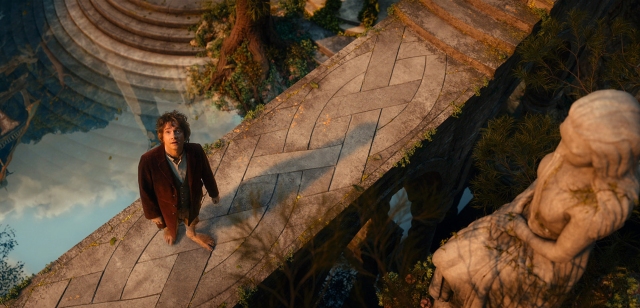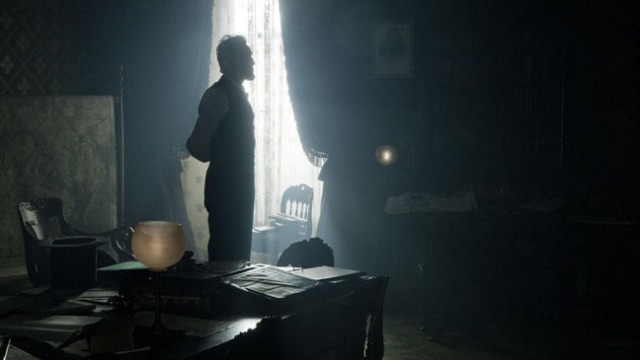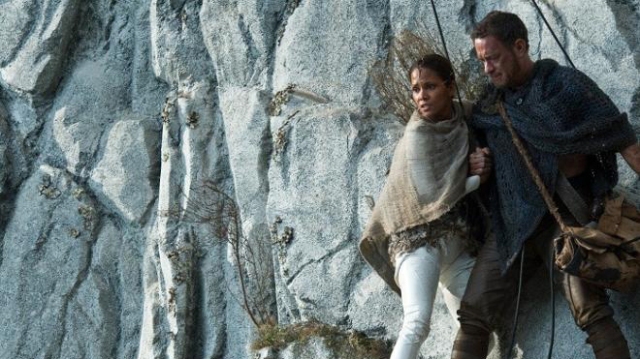The Hobbit: An Unexpected Journey (2012)
Directed by Peter Jackson. Starring Martin Freeman, Ian McKellan, and Richard Armitage.
The Hobbit is not The Lord of the Rings.
You would do well to remember that. Perhaps even to repeat it to yourself a couple times. It will help you when you read this review, or any review, or–and perhaps most importantly–when you’re watching the movie.
I normally take great pains to avoid reading reviews of movies until I write my own. But given that I work a full time job and thus often take a while to get around to writing a review, some opinions become very difficult to avoid, particularly if one refuses to go on a social media hiatus (which I do). And the outpouring of opinions ranging from vitriol to ovation demands an explanation. And we’ll get to that. We’ll talk about The Lord of the Rings, we’ll talk about Peter Jackson, we’ll talk about 48 frames-per-second, we’ll talk about that brown wizard guy, we’ll talk about all of that, but first, let’s talk a bit about what exactly we are dealing with here.
The Hobbit, or There and Back Again by J.R.R. Tolkien was first published in the UK in 1937 as a children’s fantasy novel. In it’s original edition, it ran 310 pages. It introduced the characters Bilbo Baggins and Gandalf the Grey, the world of Middlearth, and everything that came with that. But it wasn’t until 1954, 17 years later, with the publishing of The Lord of the Rings Trilogy, that the term “epic fantasy” entered into our vocabulary.
On the back of some editions of Neil Gaiman’s Stardust, there is a press clipping that refers to the novel as a work of “pre-Tolkien british fantasy.” Given that Stardust was published 44 years after, The Lord of the Rings, you should get an idea of just how much LOTR changed our perception of just what exactly “fantasy” means.
Cut to ten years ago (has it really been that long?). The film adaptations of each of The Lord of the Rings novels hit the big screen, breaking award show and box office records, and turning Peter Jackson into a household name.
When The Hobbit when into production a few years later, it was initially planned as two films, with Guillermo del Toro, praised director of the dark fantasy film Pan’s Labyrinth, poised to direct, with Jackson producing. For unknown reasons, del Toro left the project and Jackson climbed back into the director’s chair, to produce an epic, Lord of the Rings-style trilogy culled from various editions of The Hobbit and other Tolkien materials.
The point I’m taking a long time to get to is this (and I think it goes a long way to explaining the mixed reaction to this movie), I think Peter Jackson was attempting to direct The Hobbit as if it was written in a style that hadn’t been invented yet. It’s like dressing a toddler in it’s parents clothing and wondering why it has trouble walking. The Hobbit is not The Lord of the Rings.
The Lord of the Rings was an epic fantasy about a group of individuals banning together to fight a powerful evil. The Hobbit has those elements but that’s not what it’s about. It’s a character story, about a man (read: hobbit) deciding to leave the comfort and security of his home to experience an adventure he would remember for the rest of his life. It’s a rousing story of life-affirming experience, which is not a way I would ever choose to describe The Lord of the Rings. The purpose of Thorin and his company can’t begin to compare with that of Aragorn and friends in terms of nobility, courage, urgency or importance. As characters, they don’t carry half the draw of the LOTR gang. Bilbo on the other hand is infinitely more engaging than his Lord’s counterpart Frodo. He has more agency, more personality, and more depth. In short, he has more character. To reiterate, The Lord of the Rings is about the conflict between good and evil, The Hobbit is about Bilbo.
With this in mind, let’s turn back to the movie. What we are watching is one third of a single story about a single primary character stretched into a 2 hour and 50 minute film. We leave the main character for long stretches of time, watching action sequences that lack much of the drama that was present in The Lord of the Rings, and tangentially related political scenes that feebly attempt to tie what we are seeing to the high drama of that series. And it just doesn’t work that way. It’s not any one’s fault that it doesn’t work, because it was never supposed to. But it is Jackson’s fault for thinking it would.
However, it’s clear he knew he wasn’t making The Lord of the Rings 2. He recognized differences in the tone and humor of the two works, and recognized that it was Bilbo that mattered, choosing to divide the story based on the dwarves various levels of acceptance towards the half-ling. But if he knew it was all about Bilbo, it raises many question about the choices made in the script. Why is Frodo Baggins in this movie? Why is Saurumon in this movie? Why is there a pot-smoking brown wizard in this movie? Why do we need to see the full fight with the Goblin King if Bilbo spends the majority of the time having the exchange with Gollum. How does any of this help us build a connection with Bilbo? Doesn’t a lot of this break our connection with Bilbo since we have so much more knowledge of what’s happening than he does? By shoving all that crap into this movie and showing in it in 48 frame projected, 3D, IMAX whatever he effectively turned The Hobbit into the film version of the 2012 New York Jets offense.
(For anyone wondering, we use 24 frames per second for several reasons. Primarily because it gives the correct amount of motion blur and depth we see in real life. Home video is shot at 30 frames per second. This is why video looks flatter and crisper and therefore more unrealistic than film. So imagine jacking it up to 48 frames per second, removing motion and making images seem even crisper than real life. It would look stupid. And it does. Also the New York Jets were mostly in the news this year because of their offseason acquisition of former collegiate great Timothy Tebow. But since Tebow is essentially worthless as a professional, they instead kept trying to use him in “creatvie” or “gimmicky” ways to make their stagnant offense more productive. While this was occasionally exciting, it was mostly just sloppy and embarrassing for everyone involved and the Jets wound up with their worst record in 5 years and missing the playoffs by several games).
Anyways, I think this gets at the heart of what’s going on here. Some people went to see a movie like The Lord of the Rings and were disappointed and confused. Some people went to see things that happened in the book, happen in a movie, and they did, so they couldn’t complain too much. Some wanted to see a gripping retelling of The Hobbit and were left ultimately unfulfilled for reasons previously mentioned. Others, like me, just went hoping to see a fun adventure movie and have a good time, and that’s mostly what we got. I actually didn’t mind the frame rate too much, although I was constantly aware of it. It kind of worked with this story but I don’t see it becoming the wave of the future. And I’m still looking forward to parts 2 and 3 because how often do you get to see something like this on this scale? There’s plenty of stuff there to latch onto, but there won’t be records or awards this time around. But that has to be ok. To expect otherwise is to set an impossible standard.










